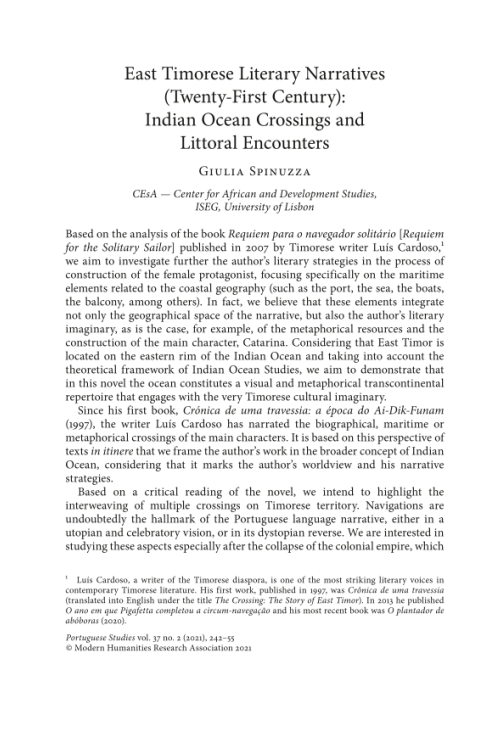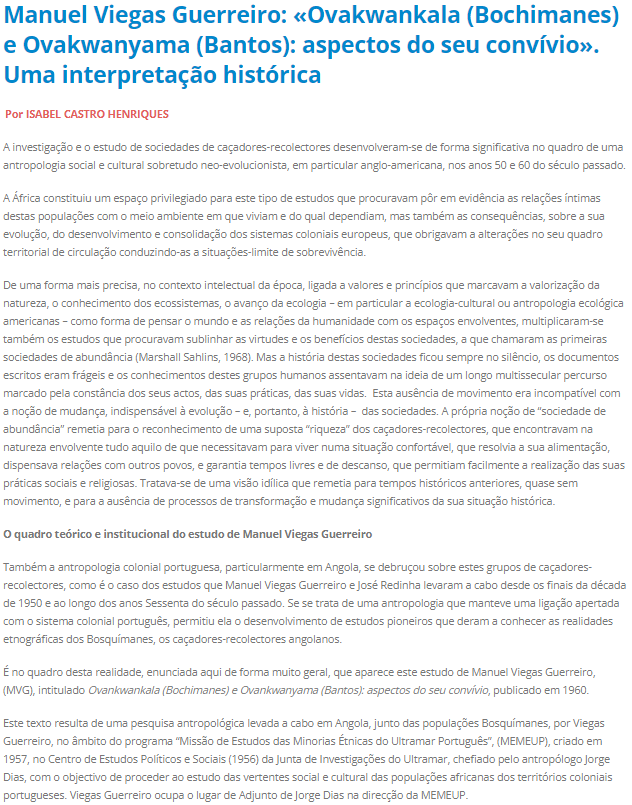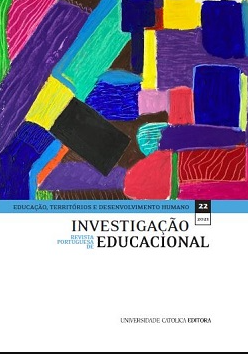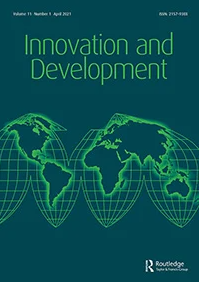CESA

Literatures and Cultures of the Indian Ocean
Abstract:
Portuguese Studies is a biannual multi-disciplinary journal dedicated to research on the cultures, literatures, history, and societies of the Lusophone world. Ana Mafalda Leite, Elena Brugioni, and Jessica Falconi were the organizers of this issue of the journal, Literatures and Cultures of the Indian Ocean. The president of the Editorial Board for 2021 is Catarina Fouto, and the Journals editor is Emanuelle Rodrigues Dos Santos. The journal is published by the Modern Humanities Research Association (MHRA), an international organization with members in all parts of the world. The aim of the Association is to encourage and promote advanced study and research in the field of modern humanities. It is concerned to break down barriers between scholars working in different disciplines and to maintain the unity of humanistic scholarship in the face of increasing specialization. The present volume results frorn the scholarly work conducted by members of the research project NILUS — Narratives Ofthe Indian Ocean in the Lusophone Space. The main purpose of the project consisted in establishing a theoretical and disciplinary connection between Lusophone Literary, Visual and Cultural Studies and the transdisciplinary field Of Indian Ocean Studies. The project on the written and visual narratives hailing from, or related to, the territories formerly colonized by Portugal along the Indian Ocean, specifically Mozambique, Goa, and East Timor. This volume, therefore, constitutes an attempt to bridge a significant critical and disciplinary gap, motivated by an almost total lack of dialogue among the above-mentioned fields of study. This lack of dialogue becomes ever more apparent if we bear in mind the increasingly central role played by historical, anthropological, literary, and cultural studies of the Atlantic Ocean in addressing colonial and postcolonial cultural and identity-related outputs and relations from the territories that Out Of Portuguese colonial rule. Consider, for instance, the influence of the notion of Brown Atlantic (Atlântico Pardo), de,’eloped by the anthropologist Miguel Vale de Almeida as a counterpoint to Paul Gilroy’s Black Atlantic, or the use of the Portugal -Brazil-Angola triangulation in comparative and transnational- oriented literary and cultural studies.4
Quotation:
Leite, A.M.; Brugioni, E. & Falconi, J. (2021) (eds). “Literatures and Cultures of the Indian Ocean”, Portuguese Studies 37.2.

Enchanted Things to Narrate the Oceans: João Paulo Borges Coelho and Luís Cardoso
Abstract:
Enchanted Things to Narrate the Oceans: João Paulo Borges Coelho and Luís Cardoso stems from the research developed under the NILUS project and, in particular, falls within the research strand that explored the role of material culture and materiality in contemporary narratives of the Lusophone Indian Ocean. The paper focuses on the short story ‘O Pano Encantado’ (2005) by João Paulo Borges Coelho and the novel Requiem para o Navegador Solitário (2007) by Luís Cardoso – two narratives set in island spaces, the small island of Mozambique and the island of Timor, respectively. It aims to validate the hypothesis that the appeal to material culture and materiality offers a way of narrating and remembering (in) the Indian Ocean from different shores of its range. The article was produced for the Modern Humanities Research Association (MHRA), an international organization with members in all parts of the world. The aim of the Association is to encourage and promote advanced study and research in the field of modern humanities. It is concerned to break down barriers between scholars working in different disciplines and to maintain the unity of humanistic scholarship in the face of increasing specialization.
Quotation:
Falconi, J. (2021). Enchanted Things to Narrate the Oceans: João Paulo Borges Coelho and Luís Cardoso. Portuguese Studies, 37(2), 224–241. https://doi.org/10.5699/portstudies.37.2.0224

Beyond Nationhood: Other ‘Declensions’ in African Literatures
Abstract:
In the last two decades, Portuguese-speaking African literature, as a field of critical inquiry and object of academic study,1 has been undergoing a great expansion, with numerous dissertations, monographs, conference proceedings, special issues of journals, and articles produced in several countries. The article Beyond Nationhood: Other ‘Declensions’ in African Literatures traces the evolution of the national perspective in the studies of Lusophone African Literatures from the 1980s to the present. Based on a selection of collective and individual publications, as well as highlighting impor tant academic events for the area, the article seeks to identify lines of continuity and moments of rupture in the approach of these literatures based on the idea of Nation as a critical category and unity of analysis, from the consolidation of the link between literature and national independence affirmed after decolonization until the reception of post-colonial theories which occurred in the mid-1990s. Also, the article looks at the theoretical and disciplinary articulations between African Literature, Postcolonial Studies, Indian Ocean Studies and Comparative Litera tures, to provide a possible mapping of the most recent approaches that seek to build new critical cartographies for the studies of these literatures.
Quotation:
Falconi, J. (2021). Beyond Nationhood: Other ‘Declensions’ in African Literatures. Abriu: Estudos De Textualidade Do Brasil, Galicia E Portugal, (10), 9–38. https://doi.org/10.1344/abriu2021.10.1

Literatura colonial de autoria feminina: O Último Batuque, de Maria do Céu Coelho
Abstract:
Portuguese colonial literature written by women has received little attention in Lusophone literary and cultural studies. The most relevant exception, in this regard, is the case of Maria Archer, author of a significant number of fiction and non-fiction texts of colonial setting and theme that have received diverse readings and analyses. In particular, Ferreira’s works on women’s authorship writing and the connections between gender, nation and empire were pioneers in approaching this production according to an integrated theoretical framework, capable of illuminating material and symbolic transits and identity reverberations between nation and empire, in line with the paradigms of colonial and feminist historiography of the 1990s. Literatura colonial de autoria feminina: O Último Batuque, de Maria do Céu Coelho, aims to deepen and broaden the knowledge of Portuguese women’s writing on colonial themes, by providing a reading of the book O último batuque (1963) by Maria do Céu Coelho, published in Mozambique in the early 1960s. It is a singular work, for focusing on the eminently masculine topic of hunting from a woman’s perspective, and also for being a hybrid book that combines memorialistic writing and short novellas about the rural universe of colonial Mozambique. The paper discusses some of the essential characteristics of Portuguese colonial literature, as it has been conceptualized by several authors in previous studies. Resorting also to the vast literature on the articulations between gender, empire, and colonialism, the article seeks to equate the author’s position in the corpus of colonial literature, as well as to reflect on how her literary writing articulates race and gender.
Quotation:
Falconi, Jessica (2021) “Literatura colonial de autoria feminina: O Último Batuque, de Maria do Céu Coelho,” Portuguese Cultural Studies: Vol. 7: Iss. 1, Article 4.

East Timorese Literary Narratives (Twenty-First Century): Indian Ocean Crossings and Littoral Encounters
Abstract:
The aim of East Timorese Literary Narratives (Twenty-First Century): Indian Ocean Crossings and Littoral Encounters is to analyze the book Requiem para o Navegador Solitário (2007) [Requiem for the Lonely Sailor] by Luís Cardoso considering the maritime elements that emerge in the novel and combining Indian Ocean Studies with Gender Studies. Pointing to the Timorese imaginary and the female protagonist’s perspective, we will focus on the elements related to the island’s coast, such as the shore, the sea, ships, sailors, and the interconnection with other islands and territories during the colonial period. In fact, we believe that these elements integrate not only the geographical space of the narrative, but also the literary imaginary, as is the case, for example, of the metaphorical resources and the construction of the main character, Catarina. Considering that East Timor is located at the eastern edge of the Indian Ocean and taking into account the theoretical theory of Indian Ocean Studics, we intend to demonstrate that in this novel the ocean constitutes a visual and metaphorical transcontinental repertoire that relates to the Timorese cultural imaginary itself. We will analyze the connection between the existential trajectory of Catarina, the novel’s female protagonist, the history of East Timor and the Indian Ocean crossings. This text, written in Portuguese by a Timorese author, portrays the complex history of this territory during World War II and offers a unique perspective on Timorese history.
Quotation:
Spinuzza, G. (2021). East Timorese Literary Narratives (Twenty-First Century): Indian Ocean Crossings and Littoral Encounters. Portuguese Studies 37(2), 242-255. doi:10.1353/port.2021.0017.

História de São Tomé e Príncipe: da descoberta a meados do século XIX
Abstract:
In História de São Tomé e Príncipe: da descoberta a meados do século XIX, the author explains how the Portuguese navigators arrived on the islands of São Tomé and Príncipe in the third quarter of the fifteenth century and transformed them into a social context for their development, but in which human and institutional relations were complex and even unbearable for the most disadvantaged, particularly on the island of São Tomé. Conflicts of all kinds worsened, particularly after the transition from a residential to a plantation society, with the intensification of the slave trade and the production and export of sugar. The long distance of the islands from the central power, located in Lisbon, constituted an ingredient that favoured the fomentation of conflicts in which the disrespect for the established rules was permanent and maintained during the period of domination of the native elite since the 17th century, marked around the main families that disputed access to power and control of wealth. The author shows that, despite its harshness, the colonial slave model had dynamics of social mobility that allowed some enslaved people to become free and others to become powerful in economic and political terms, even during the 16th century, becoming dominant until the mid-19th century.
Quotation:
Espírito Santo, A. (2021). História de São Tomé e Príncipe: da descoberta a meados do século XIX. Lisboa: Edições Colibri.

Historical Guide to an African Lisbon
Abstract:
Lisbon, a city of as many valleys and hills as there are myths surrounding its history and the people who invented it, stretches along the Tagus, where the river ends its course through Iberian land and plunges into the Atlantic Ocean. Lisbon was born on the hill of São Jorge Castle, where a Bronze Age settlement left its traces, which crossed with many other marks engraved by Greeks, Phoenicians, Lusitanians, Romans, Visigoths, Arabs, Jews and Christians. A long road of people and cultures, of stories and legends, of gods and heroes who, like Ulysses the mythical founder of the city – Olisipo – which owes its name to him, built and rebuilt this urban space. The aim of Historical Guide to an African Lisbon, XV-XXI Century is to show Lisbon’s Africanness, dispersed in a plurality of memories and immaterial and invisible traces in the days in which we live. History tells us about the settlement and life of thousands of Africans who for centuries took part in the process of building the Portuguese national fact. Travelling through the city, armed with historical knowledge, we are surprised by the vigorous African presence that invaded all spaces of Lisbon society, we reconstruct a hidden Lisbon, submerged by a centuries-old prejudice that still dominates our collective imagination and we understand, with greater clarity, not only behaviours, values, practices that remain in urban daily life, but also the constant reinventions of Portuguese and African identities, present in the country.
Quotation:
Castro Henriques, I. (2021). « Historical Guide to an African Lisbon, XV-XXI Century», versão revista e actualizada, Lisboa, Edições Colibri, 2021.

Manuel Viegas Guerreiro: «Ovakwankala (Bochimanes) e Ovakwanyama (Bantos): aspectos do seu convívio». Uma interpretação histórica.
Abstract:
The research and study of hunter-gatherer societies developed significantly within the framework of a mainly neo-evolutionist social and cultural anthropology, particularly Anglo-American, in the 1950s and 1960s. Africa constituted a privileged space for this type of study which sought to highlight the intimate relations of these populations with the environment in which they lived and on which they depended, but also the consequences, on their evolution, of the development and consolidation of the European colonial systems, which forced changes in their territorial framework of circulation, leading them to situations at the limits of survival. In a more precise manner, in the intellectual context of the time, linked to values and principles which marked the valorisation of nature, knowledge of ecosystems, the advance of ecology – in particular American cultural-ecology or ecological anthropology – as a way of thinking about the world and humanity’s relations with the surrounding spaces, there was also a multiplication of studies seeking to underline the virtues and benefits of these societies, which were called the first societies of abundance (Marshall Sahlins, 1968). But the history of these societies always remained silent, the written documents were fragile and knowledge of these human groups was based on the idea of a long, multi-secular path marked by the constancy of their acts, their practices and their lives. This absence of movement was incompatible with the notion of change, which is indispensable to the evolution – and therefore the history – of societies. The very notion of “society of abundance” referred to the recognition of a supposed “wealth” of hunter-gatherers, who found in the surrounding nature everything they needed to live in a comfortable situation, which solved their food needs, dispensed with relations with other peoples, and guaranteed free time and rest, which easily allowed them to carry out their social and religious practices. This was an idyllic vision that referred back to previous historical times, almost without movement, and to the absence of significant transformation and change processes in their historical situation. In Manuel Viegas Guerreiro: «Ovakwankala (Bochimanes) e Ovakwanyama (Bantos): aspectos do seu convívio». Uma interpretação histórica. Isabel Castro Henriques comments on the homonymous study conducted by Manuel Viegas Guerreiro.
Quotation:
“Castro Henriques, I. (2021). «Manuel Viegas Guerreiro – Ovakwankala (Bochimanes) e Ovakwanyama (Bantos): aspectos do seu convívio. Uma interpretação histórica. Lisbon, Newsletter Fundação Manuel Viegas Guerreiro, no 27, julho-setembro 2021, pp. 10-16.”

Sources and consequences of teachers’ stress during the Covid-19 pandemic
Abstract:
The covid-19 pandemic has had serious and unprecedented consequences on multiple facets of education. Teachers, students, schools and families have been affected, and the impacts of the pandemic will spill over into the future as well. The aim of Fontes e consequências do stress dos professores durante a pandemia da Covid-19 is to identify and explain the sources and consequences of teachers’ work-related stress and burnout during the pandemic, as well as their job and life satisfaction. Three sources of stress are considered: changes in organisation, content and amount of work; student behaviour and performance; and technostress. The empirical research is based on an original online survey applied to public school teachers (ISCED 2 and 3) in Portugal. Information is collected for four periods: before the pandemic; in the first school closure period in 2020 (16 March-16 September); in the second school closure period in 2021 (15 January-5 April); in the survey period (June-July 2021). The data collected include characteristics and changes about: teachers and their families; job satisfaction, stress and burnout; life satisfaction; working time and teaching duties; work-life balance; teaching goals, methods and outcomes; job stress; conditions for doing remote teaching; expectations for the 2021-22 school year. The results show that teachers’ work stress increased during the pandemic, with student behaviour and performance being a relevant explanatory factor. Difficulties in reconciling work and personal time are also predictors of teachers’ work stress. There are also signs of increasing burnout.
Quotation:
Pato, S., & Fontainha, E. (2021). Fontes e consequências do stress dos professores durante a pandemia da Covid-19. Revista Portuguesa De Investigação Educacional, (22), 1-17. https://doi.org/10.34632/investigacaoeducacional.2021.10467

Innovation in development cooperation: emerging trajectories and implications for inclusive sustainable development in the 21st century
Abstract:
In the past twenty years, innovation has slowly, but steadily, become an important presence in development cooperation discourse and practice. The ambitious UN 2030 Sustainable Development Agenda has accelerated this trend, providing a strong framework for the main argument in favour of an innovation agenda for international development: without new ideas and innovative solutions, solving the current global development challenges will not be possible. Although this innovation-push is in line with a wider predominant view of innovation as an inherently positive force of progress, that alone does not explain when, how, and why innovation becomes a key topic in the field. This article seeks to fill this gap in the literature, providing an initial overview of innovation in development cooperation in the post-2000s. It argues, firstly, that innovation has always been part of international development policy and practice. Secondly, it links the recent strengthening of the innovation discourse to three trends in the systemic transformation of the field: the triumph of metrics-based agendas, the ICTs and digitalization revolutions, and the role of private sector actors. It concludes by critically assessing the implications of this narrative in changing the politics of innovation towards more inclusive sustainable development policies and practices.
Quotation:
Ana Luísa Silva (2021) Innovation in development cooperation: emerging trajectories and implications for inclusive sustainable development in the 21st century, Innovation and Development, 11:1, 151-171, DOI: 10.1080/2157930X.2020.1807100





